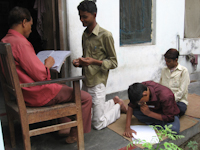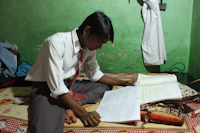The Indian FairMail teenagers are currently in the most important weeks of their school year: exam time. Especially for those in 10th grade the exams are very important as their scores are decisive for being admitted into the university of their choice after 12th grade. To an outsider the university admission system in India seems nearly impossible due to factors like the caste system, the amount of students and the pressure to succeed.
A chance of 1 in 1.000 to get in
In a country of 1.27 billion inhabitants (!) where more than half of the population is under 25 years old, just imagine the amount of students trying to get into university each year. Actually there are 20 million higher education enrolments per year in India. There simply aren’t enough seats to meet the educational demand. For one certain medical university there are more than 80.000 candidates for only 70 vacancies.
The lower your caste, the less intelligent you need to be to get in
Even though the caste system is officially abolished in India a significant number of seats are reserved for students from lower castes. Sometimes up to 50%. This entails that in the case that two FairMail teenagers (coming from similarly poor families) apply to enter medical school the FairMail teenager from higher caste needs to get higher marks to get in than his or her colleague from a lower caste.
Private tuition is the norm, even if you go to an expensive private school
Even though the oldest FairMail teenagers can now afford a more expensive private school they still need to spend time and money on private tuition after classes. Private tuition is the norm, even if you go to the most expensive private schools.
Pressure to succeed leads to high suicide rate
All the factors above lead, amongst others, to suicide being the second-leading cause of death in the 15-29 age group in India. One Indian sociologist explains that “A civilisation which was not very familiar with symbols of wealth and celebrated simplicity in lifestyle became, in the course of a generation, obsessed with upward mobility. This led to the cult of success which puts big pressure on Indian students wanting to get ahead in life.” That is why we discuss plan B with our students in case their dreams turn out too high fetched.


